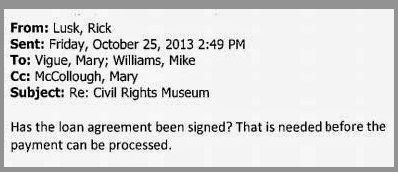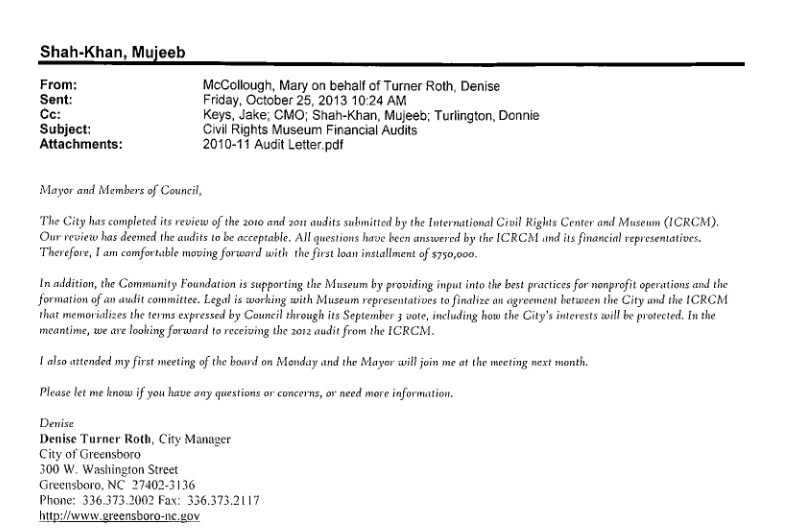Greensboro City Councilman Tony Wilkins was livid to find that a loan agreement between the City of Greensboro and the International Civil Rights Center and Museum (ICRCM) for $1.5 million, in two installments of forgivable loans, had not been signed.
“I just can’t imagine issuing a check for three quarters of a million dollars without a contract,” Wilkins told the News & Record.
The revelation came to light on Feb. 14, during a city council meeting when recently appointed city manager, Jim Westmoreland, produced the contract –upon Wilkins’ request– without a signature from the ICRCM.
The ICRCM is the museum dedicated to the Greensboro Four who held a sit in at a Woolworth’s lunch counter that became the genesis of the civil rights movement.
“The ICRCM is American history and Greensboro history,” said Mayor Nancy Vaughan. “We are obligated to protect this landmark and ensure it never fades from our minds.”
“The museums finances and leadership have often been polarizing, but were the museum to be foreclosed on the historic lunch-counter and other possessions would possibly no longer be in the public’s hands.”
The loan agreement had been delayed several times this winter, contingent upon an ICRCM self-audit that was requested by the City Council in late 2013.
The check had been issued before the audit was delivered to the city council and without a signature from the ICRCM.
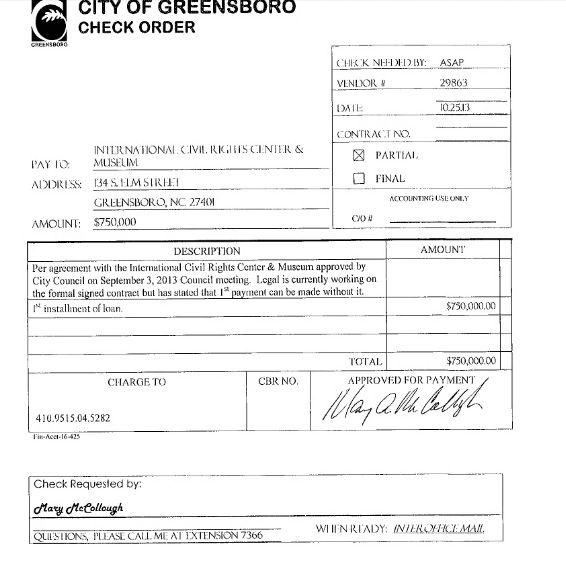
“I really feel let down by staff and the museum,” said Mayor Nancy Vaughan to the News & Record.
After three months of procrastination, the ICRCM produced the self-audit, which showed that $750,000 dollars had been transferred from the city in October, when the audit was originally due. However, the audit wasn’t given to city council until Feb.1; the day the council believed the city would begin its first installment of the loan.
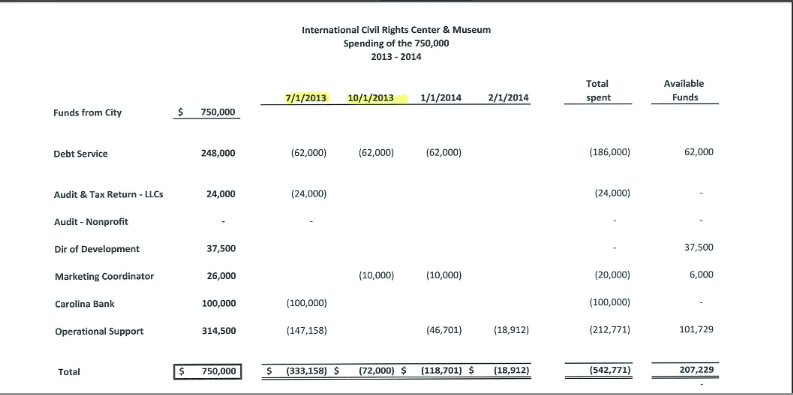
In documents released by the City of Greensboro, an e-mail exchange on Oct. 24 – 25, shed light on how the check had been issued before receipt of a signed contract.
Former City Manager Denise Turner-Roth asked City Attorney Mujeeb Shah-Khan if it was legal for her to cut a check without a signed contract.
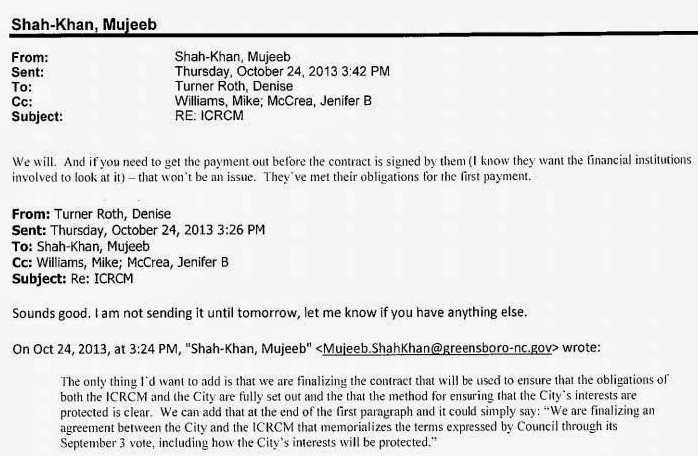
The following day, on Oct. 25, Greensboro Director of Financial and Administrative Services Rick Lusk advised Shah-Khan and Turner-Roth against proceeding without the signature of the ICRCM.
At this point, Interim Assistant City Manager Mary Vigue e-mailed Lusk hoping to assuage the concerns of the Director of Financial Services by relaying that Shah-Khan said the issuing of moneys was legal.
“According to Mujeeb, we may proceed without the signed agreement,” said Vigue in the e-mail exchange.
“As long as everyone understands the risks of circumventing the internal control system,” warns Lusk in response.
“We understand the risks,” said Shah-Khan.
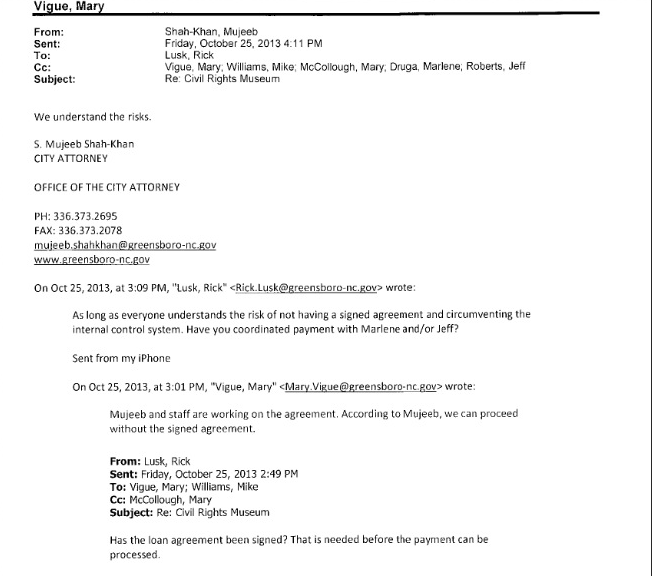
That same day, Turner-Roth sends an e-mail to the city.
“Our review has deemed the audits to be acceptable,” said Turner-Roth in the email.” All questions have been answered by the ICRCM and its financial representatives. Therefore, I am comfortable moving ahead with the first loan installment of $750,000–In the meantime, we are looking forward to receiving the 2012 audit from the ICRCM.”
Shah-Khan, who declined to be interviewed by The Guilfordian, said during the Feb. 14 city council meeting that he did not believe the city could recall the money that was paid without a signed loan agreement.
Leadership at the Greensboro City government and the ICRCM has been in a state of flux since October.
Mayor Nancy Vaughan won the mayoral election in Nov. 2013, and assumed office in January, vacating her position on the city council.
ICRCM interim Chairman George Clopton oversaw the loan negotiations after the city requested new leadership as a condition to the loan agreement in June.
City Manager Jim Westmoreland assumed his position in January after his predecessor, Turner-Roth, was appointed to a federal position by the Obama administration.
The agenda of the Feb. 14th council meeting was to review the self-audit of the ICRCM. In his preparations for the meeting Westmoreland came across the unsigned contract. His staff acted swiftly to get the contract redrawn, signed and notarized by the ICRCM.
However, after the disclosure of the city and ICRCM operating for three months without a signed contract the city council moved to discontinue payments to the ICRCM.
During that same meeting, Clopton announced that he had submitted his resignation to the chairmanship of the ICRCM in January, and that at that time the board had elected Guilford College alumna Deena Hayes as new chair of the ICRCM board.
Longtime museum board member and attorney Doug Harris, whose name appears in the contract, said that Clopton had intended all along to serve temporarily according to the News & Record.
Many on the city council were under the belief that Clopton had been elected as a permanent chairman as is evident in documents that were notarized without an indication that his tenure would be limited to an interim basis.
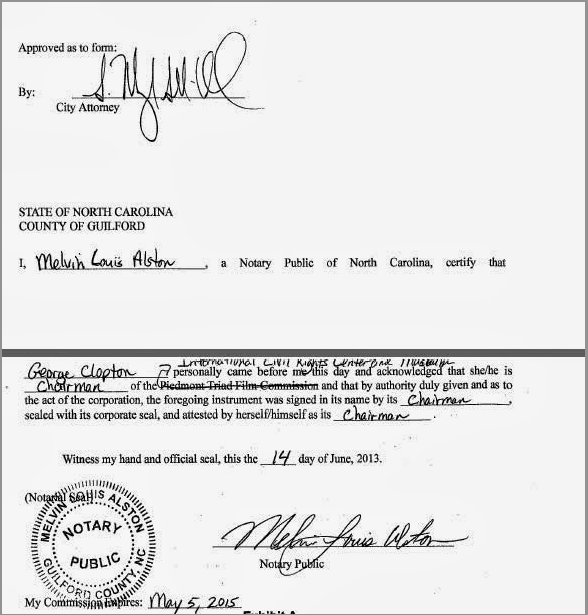
The ICRCM has suffered through financial strife and relied upon financial support from the City of Greensboro since its founding. It has defaulted on loans and mismanaged money numerous times.
With the changes in leadership of the city and the ICRCM, compiled with the failure of the city to secure a contract, the future of the ICRCM is more uncertain than ever.
“The ICRCM is very significant for Greensboro, which has a long history of both racism and civil rights activism,” said Thomas Guthrie, associate professor of sociology and anthropology.
“Museums and historic sites, such as the ICRCM, are important because they provide opportunities for honest, open conversations about our past, present, and future.”
Hayes now has the responsibility of guiding the ICRCM into a sustainable financial situation while distancing the error of Greensboro politicians from the ICRCM’s board of trustees.
However, Hayes has many detractors from her time in city government, where she served as a member of the Guilford County School Board since 2002.
“Deena Hayes has a divisive, race-based, race-baiting agenda and will do whatever it takes to execute that agenda,” said Erik Huey, Greensboro civil activist. “She’s a divider, not a uniter.”
Hayes also has 15 years of community organizing, 10 years as a Guilford County School Board member and is now the leader of the ICRCM board.
The City of Greensboro officials are scrambling to place blame for this failure in fiduciary responsibility.
On Feb. 18, Councilman Wilkins requested an inquiry into Turner-Roth’s activities while serving as City Manager.
The future of the ICRCM may be unclear, and its omissions and delays of payments curious. However, it is clear what the next steps are for Greensboro officials.
The city council has recently frozen payments to the ICRCM, and even though Westmoreland produced a signed contract after exposing the unsigned contract, the city council voted unanimously to discontinue the agreement.
The City Attorney who declared Turner-Roth’s payment legal said it may be too late to recoup the money.
At the Feb. 14, council meeting, Shah-Khan said the contract has provisions to take the money back if the museum is in default. However, the museum is not in default because they have $750, 000 of tax payer money.
This answer infuriated the council more. On Feb. 21, Shah-Khan announced his resignation as city attorney.
The only two positions that the city council has the power to fire are the city attorney and the city manager. All other appointees are at the discretion of the city manager.
Whether this is a case of incompetence, or a malicious act by members of the city government and the ICRCM is a question whose answer will determine the sustainability of the ICRCM going forward..
“I see really poor decision making by Shah-Khan and Turner-Roth, but not necessarily a crime” said Aaron Fetrow, Guilford Dean of Students and a lawyer with over four years in the courtroom.
“Shah-Khan’s resignation, and the speed of which it happened, compiled with the audit does send of alarms though,” said Fetrow. “There is clearly a valid “implied contract” in accordance with common law. I think that whoever made the decision to proceed without a signed contract was grossly irresponsible.”
“But, that’s the job of the District Attorney’s office to investigate such matters. And this could be enough evidence to warrant suspicion, and to launch an investigation.”
Mayor Nancy Vaughan believes that the ICRCM can become viable.
“Only recently has city government become an active member in ensuring the museum is sustainable,” said Vaughan. “The ICRCM and former city manager are obviously going to be scrutinized. But to lose the artifacts in that museum to a bank is a loss this city must also consider.”
“Going forward the council and I are working to never allow such an error.”
If the city finds that there were suspicious activities by Turner-Roth, members of the ICRCM board or Shah-Khan the legal process is clear.
“If there is an investigation, and enough evidence to warrant criminal proceedings, it is likely that we would request the State Attorney General conduct the matter,” said Assistant District Attorney Chris Parrish.
“And if that matter were illegal, we would request any proceeding be moved out of Guilford County so as to avoid conflicts of interest.”
The members of city council have their opinions on complicity by the key players.
“I think they did a little bait-and-switch,” said Councilman Zack Matheny. “They always said George Clopton was the new chair. He was chair long enough for them to get the money.”
If criminal proceedings are brought against Turner-Roth, Shah-Khan, or any member of the ICRCM board, the sum of $750,000 dollars would elevate this case to a felony in North Carolina.

